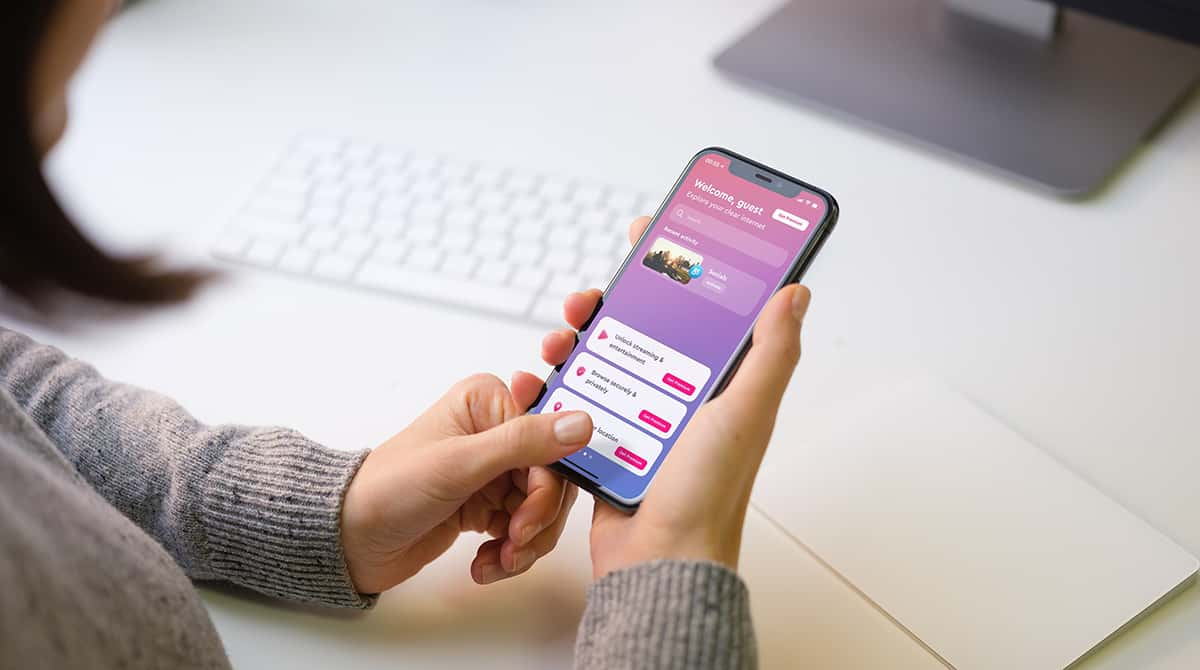VPNs and Proxy servers are the two most popular tools for ensuring privacy and anonymity on the internet. Both hide your IP and change your real location from the websites you’re using. But how are they different? We’ll take a closer look at the VPN vs proxy in terms of ease of use, connection speeds and security of your data. Let’s figure out what you should pick for yourself if your goal is to securely expand your online experience.
VPN vs Proxy: How is Proxy different from a VPN?
Let’s start with proxies. A proxy server is a midpoint between your device and the web. It changes your IP address, by this hiding your real location.
VPN stands for Virtual Private Network. It also provides you with a new IP and hides your real location. That’s where the similarities between a proxy and a VPN end.
VPNs use encryption algorithms to secure your data, which is the most significant difference between a proxy and a VPN. If you want to find out more about the VPN technology explained in simple terms, read this handy article.
Proxies Don’t Encrypt Your Private Data
Although there are different proxy protocols like HTTP, HTTPS and SOCKS, none of them encrypts your data. All your passwords, logins, and everything you’d want to keep private can easily become public. Especially the information sent over the insecure HTTP connections. If an intruder gets this traffic, they’ll have no trouble logging into your social media profiles and bank accounts.
As for VPNs, encryption is a keystone of the technology. The best VPN services use the AES-256 algorithm to secure your data. It’s also used by banks and even intelligence services all across the world. With VPN’s encryption, your data becomes ciphered into an incomprehensible mix of symbols and numbers, impossible to understand or use against you.
VPNs Boast High Connection Speeds
When it comes to VPN vs Proxy connection speeds, proxies may seem a little bit faster. It happens because they don’t encrypt your data but only tunnel it through a different server. The VPN technology has come a long way from the times when it did slow down your connection. Today’s VPNs have astonishing speeds, and you won’t likely feel any difference between connection speeds when surfing the web with and without a VPN.
At the same time, despite slightly higher speeds, proxies can’t be used for downloading and gaming. VPNs, on the other hand, allow you to download torrents and other files safely. Using a VPN when playing online games reduces the risk of being DDoSed during important matches.
Proxy Server Doesn’t Secure the Traffic
There’re website proxies, on which you need to enter a link to a resource you want to visit, and you’ll have a proxy enabled only for this tab. Other proxies are embedded features of some apps that you need to set up yourself. All the traffic that doesn’t go through the proxy tab or the app with a proxy will have your IP address pointing at your real location.
A VPN app routes all the traffic from your device through an external server, fully anonymizing all your online interactions. Even better, this traffic is secured with end-to-end encryption.
VPN Requires No Additional Set-up
If it’s a website proxy, it’s kind of simple, you just need to type in the desired address. If you want to set up a proxy that is a feature of another app, say a web browser or a messenger, you’ll have to go to the settings and configure it all there.
When comparing proxy vs VPN, the latterr is way easier to use. We've created the first effortless VPN that allows you to securely access the internet with just one tap. You just need to install ClearVPN and it’ll change all the networks settings to fit your needs.

VPN is better for streaming
If you use a proxy to change your location in order to stream some content on Netflix that’s not available in your country, you’ll see an error message from Netflix. Unfortunately, Netflix has its own smart algorithms that detect proxies and you get an error message telling you to turn the proxy or VPN off. Netflix can also detect VPNs, but not all of them. To detect VPNs Netflix has a big database of IP addresses assigned to the VPN providers. Free VPNs connect multiple users to the same server, making it clear to Netflix that they are all using a VPN.
What Are Proxies Good for?
It’s not like proxies do not stand a chance against a VPN. There’s one great case when a proxy fits your demands better than a VPN.
If you need to access a website that’s not available in your location without entering your personal data — a website proxy is the fastest way to go. Just find a suitable web-proxy and type in the link of the resource you want to get to.
Conclusion
As we looked at the VPN vs proxy, it’s clear that it’s always better to use a VPN if you’re aiming for online security and expanding your possibilities. As for proxies, they don’t encrypt your data, and that’s why their connection speed may be slightly faster compared to the VPN’s. In-app proxies require additional set-up and do not tunnel the web traffic from other apps. You can’t really stream any new movies on Netflix with a proxy.
We strive for online security and privacy for all users. That’s why we’ve created ClearVPN — the first effortless VPN for secure online interactions. Expand your possibilities and secure yourself online with ClearVPN.





